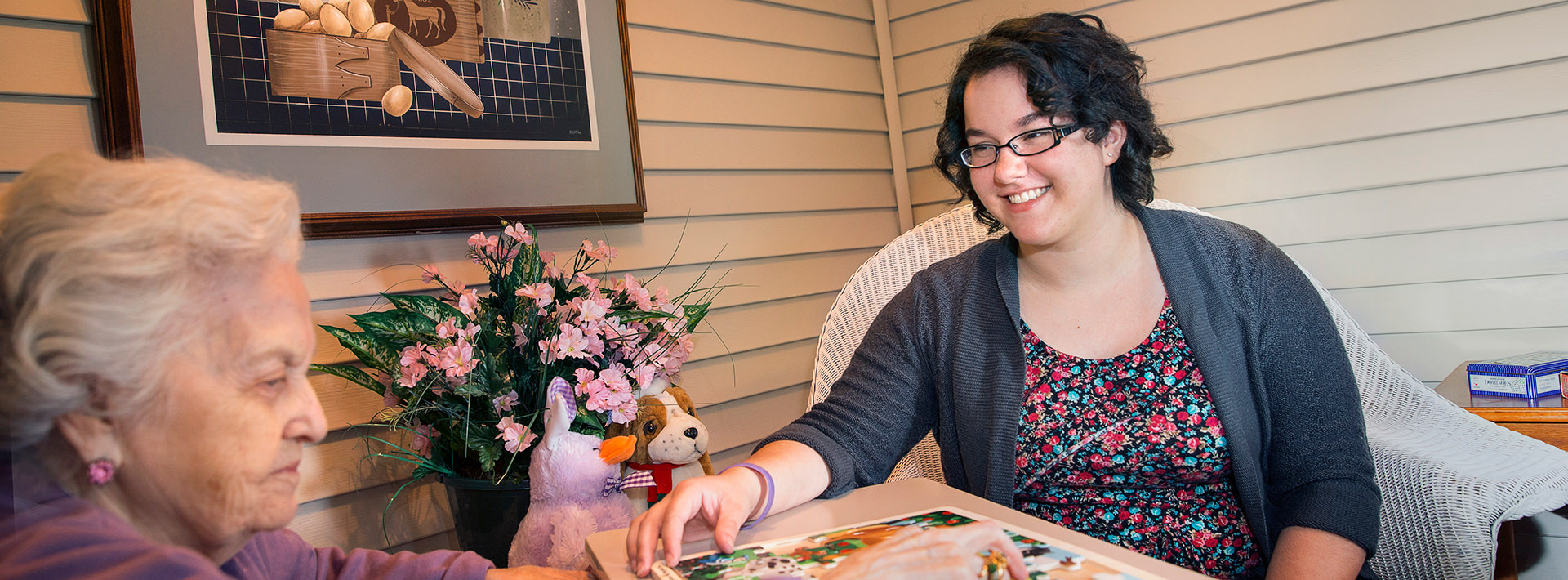Class of 2014 Success Stories: The Science of Aging
Graduate connects vocabulary word to future career

By Julie Carle
Ger•on•tol•o•gy - [jer-uh n-tol-uh-jee] noun. The branch of science that deals with aging and the problems of aged persons.
Morgan Bunting saw that word on a high school vocabulary test and was stumped. When she looked it up and saw the definition, she knew immediately it was a word she would never forget. On Friday (May 9) when the senior from Pioneer, Ohio, accepted her BGSU diploma, she earned a Bachelor of Science in Gerontology degree from the College of Health and Human Services.
That revelation more than five years ago was the beginning of her destiny that actually started when she was seven. At that time she didn’t understand why her grandmother, who had long been a constant in her life, was suddenly gone. It wasn’t until she was 14 that she learned the truth. Her grandmother had been moved into a nursing home, diagnosed with Alzheimer’s disease.
“I had been too young to understand,” Bunting said, “but when I learned about it, I was forever impacted and decided early on that I wanted to know more about the disease and if I could make a difference.”
And make a difference, she has. She was an anomaly as a freshman majoring in gerontology. “It is very rare for a freshman to come to BGSU and declare gerontology as his or her major,” said Dr. Nancy Orel, a gerontology professor and one of Bunting’s mentors. “Most students are not aware of gerontology and the potential career options available to them.”
“I came to BGSU in 2010 because BGSU is one of the few colleges that has a major in gerontology,” Bunting explained. She also decided to specialize in long-term care administration, because of the broader scope of job options after graduation.
From the beginning of her BGSU career, she has not shied away from any opportunities presented to her. She joined the Gerontology Student Association (GSA) and has been an officer, including president the past two years.
“GSA was one of the best experiences for me,” Bunting said, connecting her to like-minded, supportive and caring individuals.
In the organization, she developed leadership skills, established volunteer opportunities, organized speaker presentations, planned trips to outside agencies and developed external events such as the community-based social dance last November, said Dr. Charlie Stelle, GSA advisor and an associate professor of gerontology. “Morgan demonstrated a degree of responsibility and conscientiousness that made my role as faculty advisor a pleasure to perform,” he added.
Bunting has been highly involved in service during the past four years. She has taken every opportunity to volunteer at hospice, long-term care facilities and the local senior center. One of the most meaningful experiences was serving as a part-time caregiver for a prominent local woman who has ties to BGSU. Orel recommended Bunting for the job because of her compassion for helping people, especially those with Alzheimer’s.
Bunting thoroughly enjoyed the interaction with the woman and was “afforded many opportunities” because of the woman’s connection to BGSU. “I was invited to the president’s house, met the dean of the music college, and I got to see the President’s Suite in the union, an experience that probably not many students have,” Bunting said.
“Service in this major is important because it gives you experience you need. It provides a baseline and compassion to continue work with older adults,” she said.
She also was chosen to serve on the board of the Ohio Association of Gerontology and Education (OAGE), an important step for her as she further defined her interest in gerontology. Although she specialized in long-term care administration, as a junior she discovered her true passion in gerontology is research and academia.
Last year OAGE named her one of the top gerontology students in the state, and this year she earned the award for the top undergraduate research paper. Her paper, which focused on bereavement support for caregivers, was initiated as a project for a grant writing and policy course.
“I spent time at hospice and started to realize the need for bereavement support for caregivers,” Bunting said. “Caregivers are impacted by the death of patients, and I wanted to research programs that can provide support.”
She also co-authored a chapter on LGBT older adults and worked on a project focused on caregiver support for university employees. “While I consider all of these accomplishments laudable in and of themselves,” Stelle said, “it is through Morgan’s seeking out and creating these opportunities that they have taken place.”
Those research opportunities contributed to her next step. She was accepted in the Ph.D. program at University of Maryland Baltimore where she will move later this summer to pursue her doctoral degree in aging studies.
“I know that Morgan has the necessary skills to conduct empirical research and she will be a phenomenal faculty members,” Orel said. “Most importantly, Morgan Bunting will make a difference.”
Updated: 02/13/2018 02:14PM
